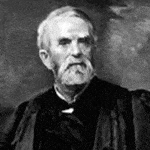
William Burnham Woods (1881-1887)
William B. Woods lived from 1824 to 1887.
Early Life and Legal Career
Woods was born on August 3, 1824 in Newark, Ohio. He began attending college at Western Reserve University (now Case Western Reserve University) in Hudson, Ohio, but later transferred to Yale University, where he completed his undergraduate education. Upon graduation, Woods returned to Ohio and read law under the tutelage of a prominent local lawyer, S.D. King. He was admitted to the bar in 1847, and entered private practice with King until 1862. Woods, a loyal Democrat, was elected Mayor of Newark in 1856, and to the Ohio General Assembly in 1858.
Stemming from his opposition to slavery, Woods decided that a Union victory was a necessity. In 1862, he left the Ohio state house to join the Union Army. He was appointed lieutenant colonel of the 76th Ohio Infantry, and eventually rose to the rank of Brigadier General before retiring from service and settling in Montgomery, Alabama. After the war, Woods returned to his law practice and took up cotton farming.
Appointment to the Supreme Court
On December 8, 1869, Woods, now a Republican, was appointed by President Ulysses S. Grant to serve as Circuit Judge for the United States Circuit Court for the Fifth Circuit. His service, however, was terminated eleven years later, due to elevation to the United States Supreme Court.
In 1880, Woods was nominated by President Rutherford B. Hayes to serve as a Supreme Court Justice. Unfortunately, Woods failed to have a major impact on the Court. He spent just six years on the bench before his death at the age of 62.
Death
Woods passed away on May 14, 1887 in Washington, D.C.







